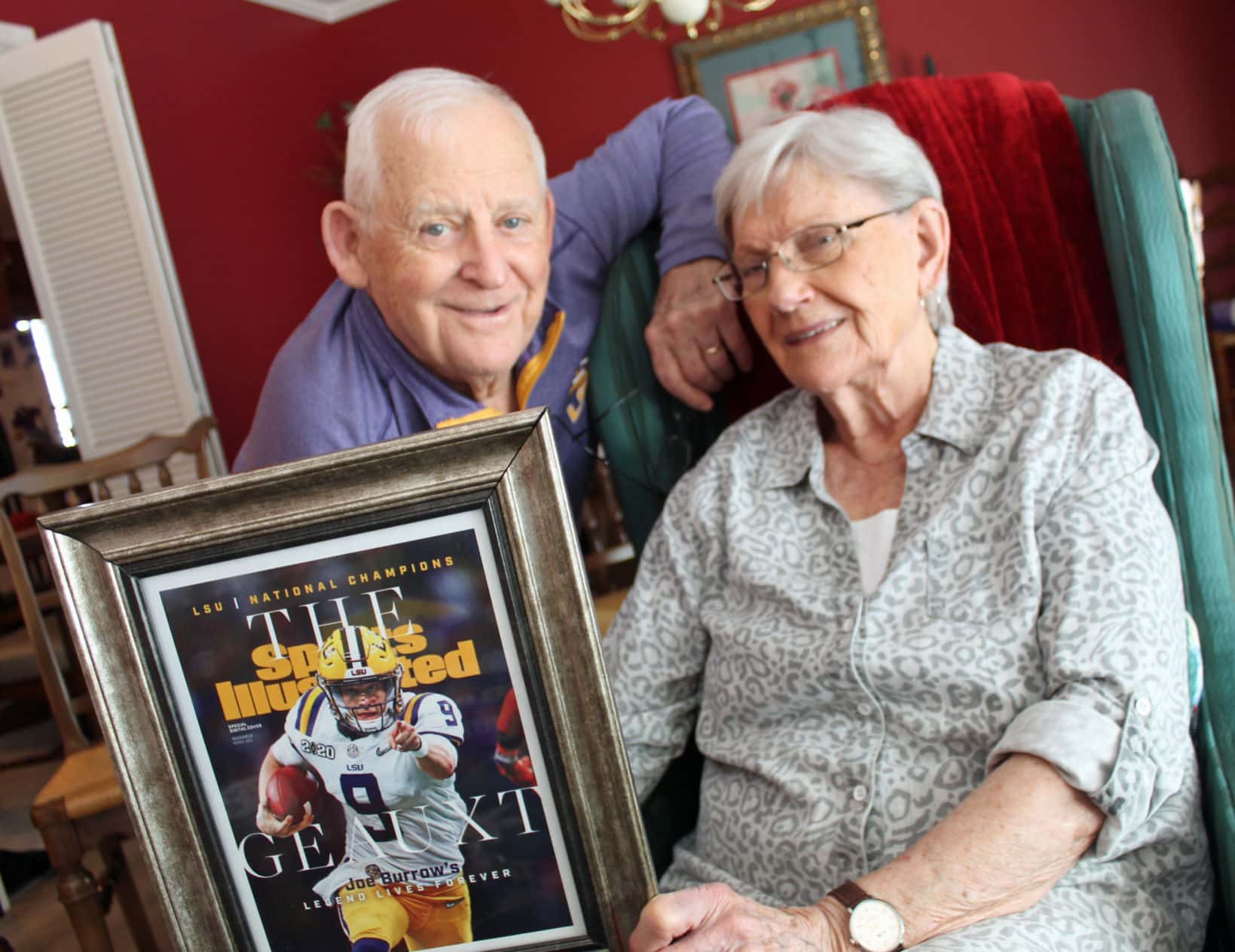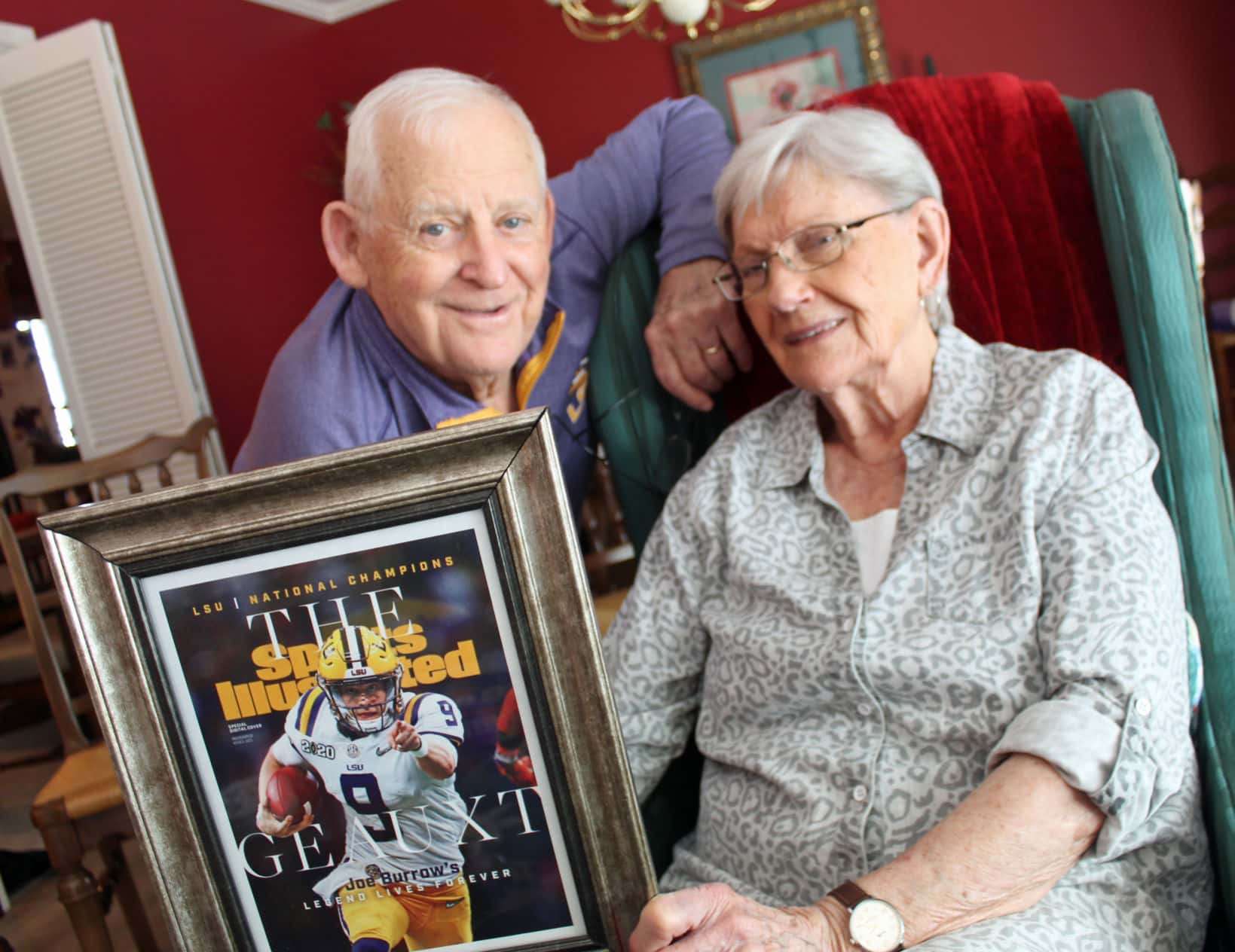Mississippi Today
Seventy-five years later, Dot Ford, now Dot Burrow, gets her due


Seventy-five years ago, a tall, thin teen-aged girl named Dot Ford scored 82 points in a high school basketball game in the tiny, northeast Mississippi town of Smithville. She averaged right at 50 points a game for the entire 1949-50 season.
Ford scored 50 points or more in 12 games. For the season, she averaged nearly two points per minute. She was a Hill Country basketball hero, big news in basketball-crazy Monroe County, Her exploits even made headlines in the newspapers nearly 200 miles away in Jackson and in Memphis.

But her fame was short-lived. Back then, there was no women's college basketball to speak of. Her basketball career ended quietly. She married her high school sweetheart, James Burrow, who had been a starting point guard at Mississippi State. Together, they raised an athletic family in nearby Amory. Dot and James lived in the same house for more than 60 years. Still do, for that matter.
All that was left of those Smithville basketball glory days were a few newspaper clippings and her own memories, and that was fine. Besides, sons Jimmy, who played football for national champion Nebraska, and Johnny, who played for Ole Miss, were making more memories. In recent years, grandson Joe – yes, that Joe Burrow – has become, by far, the most famous Burrow of all.
Basketball star Dot Ford was a largely forgotten legend. Know this: “Was” is the operative word here. Her basketball excellence is forgotten no more.
Do you believe in fate? If the answer is no, read on for the rest of this story.
I was searching for the high school baseball field where the 2022 state champions played their games. Dodging downed trees in a nearby neighborhood, I pulled over and asked directions. Major coincidence: The second guy I approached just happened to be the baseball coach, Chris Pace, who was helping neighbors clean up their yards.
He pointed out a house a few doors down and told me it was the home of the grandparents of LSU's Heisman Trophy winner and Cincinnati Bengals quarterback Joe Burrow. I walked that way and met Jimmy Burrow, Dot's son and Joe's dad, who had driven all night from his Ohio home and was helping his parents deal with major damage to their house.

The front of the house looked fine. Hidden from view was the rear of the house where the fireplace chimney had fallen through the ripped-apart roof and into the den. There was major structural damage, but the Burrows were safe. They had ridden out the tornado in the storm cellar they had built under their carport after the killer tornado that hit nearby Smithville in 2011, killing 16.
His parents, both in their early 90s, were shaken, Jimmy said, but they would be fine. In the course of the conversation, he told me about his mother's basketball accomplishments all those years ago. I filed it away.
A few days later, after writing about the tornado wreckage, I searched through newspaper archives, confirmed all Dot Burrow's remarkable statistics, and wrote the largely forgotten story of Dot Ford Burrow.
The good people at the Mississippi High School Activities Association, the governing body of Mississippi high school sports, took it from there. They nominated Dot Burrow for the National High School Hall of Fame. Just as they suspected, Dot Ford Burrow was a no-brainer. The long-awaited announcement came Tuesday. Dot Burrow will be one of four former athletes and four coaches who will be inducted into the national high.school hall of fame in the Class of 2024 this summer at Indianapolis.
Jimmy Burrow says his mother was shocked and quite emotional. She knew she had been nominated, but she never expected to join the likes of Walter Payton in a national hall of fame, not after 75 years.

Joe Burrow is one proud grandson. Said Joe Burrow when he learned the news: “My grandmother was an incredible athlete and a generational basketball player, and is arguably the best athlete in the family. Knowing how great she was has motivated me to be the best I could be in all sports.”
Baseball Hall of Famer Joe Mauer, who once hit 43 home runs for his Minnesota high school baseball team, is probably the biggest name in this year's class. Former Auburn and NFL football star Takeo Spikes, another inductee, once caught 24 touchdown passes and made 238 tackles for his undefeated Sandersville (Georgia) High football team. Forty-three home runs, 24 touchdown passes and 238 tackles are remarkable statistics.
But then so are 82 points in a single game and a 50-point scoring average for a season. Three quarters of a century later, Dot Ford Burrow finally gets the recognition she deserves.
This article first appeared on Mississippi Today and is republished here under a Creative Commons license.
Mississippi Today
On this day in 1917
May 5, 1917

Eugene Jacques Bullard became the first Black American combat pilot.
After the near lynching of his father and hearing that Great Britain lacked such racism, the 12-year-old Georgia native stowed away on a ship headed for Scotland. From there, he moved to Liverpool, England, where he handled odd jobs before becoming a boxer, traveling across Europe before he settled in Paris.
“It seems to me that the French democracy influenced the minds of both White and Black Americans there and helped us all to act like brothers as near as possible,” he said. “It convinced me, too, that God really did create all men equal, and it was easy to live that way.”
When World War I began, he was too young to fight for his adopted country, so he and other American expatriates joined the French Foreign Legion. Through a series of battles, he was wounded, and doctors believed he would never walk again.
No longer able to serve in the infantry, an American friend bet him $2,000 that he could not get into aviation. Taking on the challenge, he earned his “wings” and began fighting for the French Aéronautique Militaire.
He addressed racism with words on his plane, “All Blood Runs Red,” and he nicknamed himself, “The Black Swallow of Death.”
On his flights, he reportedly took along a Rhesus monkey named “Jimmy.” He tried to join the U.S. Air Service, only to be turned away because he was Black. He became one of France's most decorated war heroes, earning the French Legion of Honor.
After the war he bought a Paris nightclub, where Josephine Baker and Louis Armstrong performed and eventually helped French officials ferret out Nazi sympathizers. After World War II ended, he moved to Harlem, but his widespread fame never followed him back to the U.S.
In 1960, when French President Charles de Gaulle visited, he told government officials that he wanted to see his old friend, Bullard. No one in the government knew where Bullard was, and the FBI finally found him in an unexpected place — working as an elevator operator at the Rockefeller Center in New York City.
After de Gaulle's visit, he appeared on “The Today Show,” which was shot in the same building where he worked.
Upon his death from cancer in 1961, he was buried with honors in the French War Veterans' section of the Flushing Cemetery in Queens, New York.
A sculpture of Bullard can be viewed in the Smithsonian National Space and Air Museum in Washington, D.C., a statue of him can be found outside the Museum of Aviation, and an exhibit on him can be seen inside the National Museum of the U.S. Air Force, which posthumously gave him the rank of a second lieutenant. He is loosely portrayed in the 2006 film, “Flyboys.”
This article first appeared on Mississippi Today and is republished here under a Creative Commons license.
Mississippi Today
A seat at table for Democrats might have gotten Medicaid expansion across the finish line
The Mississippi Capitol is 171,000 square feet, granted a massive structure, but when it comes to communication between the two legislative chambers that occupy the building, it might as well be as big as the cosmos.
Such was the case in recent days during the intense and often combustible process that eventually led to the death of Medicaid expansion and with that the loss of the opportunity to provide health care for 200,000 working poor Mississippians with the federal government paying the bulk of the cost.
Democrats in the state House came under intense pressure and criticism for blocking a Medicaid expansion compromise reached by Republican House and Senate negotiators.
First of all, it would be disingenuous to argue that Democrats, who compose less than one-third of the membership of either chamber, blocked any proposal. Truth be known, Republicans should be able to pass anything they want without a solitary Democratic vote.
But on this particular issue, the Republican legislative leadership who finally decided that Medicaid expansion would be good for the state needed the votes of the minority party, which incidentally had been working for 10 years to pass Medicaid expansion. The reason their votes were needed is that many Republicans, despite the wishes of their leaders, still oppose Medicaid expansion.
The breakdown in the process could be attributed to the decision of the two presiding officers, House Speaker Jason White and Lt. Gov. Delbert Hosemann in the Senate, not to appoint a single Democrat to the all-important conference committee.
Conference committees are formed of three senators and three House members who work out the differences between the two chambers on a bill. Considering that Democratic votes were needed in both chambers to pass Medicaid expansion, and considering Democrats had been working on the issue for a decade while Republicans blocked it, it would have made sense that they had a seat at the table in the final negotiations process.
One Democrat from each chamber on the conference committee could not have altered the outcome of the negotiations. But the two Democrats could have provided input on what their fellow legislative Democrats would accept and vote for.
In the eyes of the Democrats, the compromise reached without their voice being heard was unworkable and would not have resulted in Medicaid expansion.
The Republican compromise said Medicaid would not be expanded until the federal government provided a waiver mandating those on Medicaid expansion were working. Similar work requirement requests by other states have been denied. Under the compromise, if the work requirement was rejected by federal officials, Medicaid expansion would not occur in Mississippi.
After voicing strong objections to the work requirement, House Minority Leader Rep. Robert Johnson, recognizing the Senate would not budge from the work requirement, offered a compromise. The Johnson compromise to the compromise was to remove a provision mandating the state apply annually with federal officials for the work requirement.
Instead, under Johnson's proposal, state Medicaid officials would be mandated to apply just once for the work requirement. If it was rejected, Medicaid expansion would not occur, but hopefully that would compel the Legislature to take up the issue of the work requirement and perhaps remove it.
“We just want the Legislature to come back and have a conversation next year if the federal government doesn't approve the work requirement. It's as simple as that,” Johnson said.
Senate leaders agreed that Johnson's proposal was a simple ask and something they might consider.
But Lt. Gov. Delbert Hosemann, who presides over the Senate, said he never heard Johnson's proposal until late in the process — too late in the process, as it turned out.
Speaker Jason White, R-West, also said he never heard the proposal, though Johnson said he repeatedly discussed it with House leaders. He certainly was relaying the information to the media during the final hectic days before Medicaid expansion died.
And perhaps if Johnson or one of his Democratic colleagues had been on the conference committee, that information would have been heard by the right legislative people and perhaps Medicaid expansion would not have died.
After all, a conference room or an office where negotiators are meeting to hammer out a compromise is much smaller than the massive state Capitol, where communications often get lost in the cosmos.
This article first appeared on Mississippi Today and is republished here under a Creative Commons license.
Mississippi Today
On this day in 1884


May 4, 1884

Crusading journalist Ida B. Wells, an African-American native of Holly Springs, Mississippi, was riding a train from Memphis to Woodstock, Tennessee, where she worked as a teacher, when a white railroad conductor ordered her to move to another car. She refused.
When the conductor grabbed her by the arm, “I fastened my teeth in the back of his hand,” she wrote.
The conductor got help from others, who dragged her off the train.
In response, she sued the railroad, saying the company forced Black Americans to ride in “separate but unequal” coaches. A local judge agreed, awarding her $500 in damages.
But the Tennessee Supreme Court reversed that ruling three years later. The decision upended her belief in the court system.
“I have firmly believed all along that the law was on our side and would, when we appealed it, give us justice,” she said. “I feel shorn of that belief and utterly discouraged, and just now, if it were possible, would gather my race in my arms and fly away with them.”
Wells knew about caring for others. At age 16, she raised her younger siblings after her parents and a brother died in a yellow fever epidemic. She became a teacher to support her family.
This article first appeared on Mississippi Today and is republished here under a Creative Commons license.
Did you miss our previous article…
https://www.biloxinewsevents.com/?p=355325
-
SuperTalk FM4 days ago
Driver’s education set to become mandatory in Mississippi as bill passes
-
SuperTalk FM2 days ago
State approves $160M to expand Highway 7 to four lanes in Lafayette County
-
SuperTalk FM6 days ago
Festival merger in Leland sets up one major event for Mississippi Delta
-
Mississippi Business5 days ago
Geartek expanding operations in Alcorn County
-
SuperTalk FM7 days ago
PERS bill set to phase in employer rate increase heads to governor’s desk
-
Mississippi News6 days ago
Two women accused of shoplifting across southeast captured in Mississippi
-
Mississippi News4 days ago
Altercation at Mississippi police department leads to officer-involved shooting
-
Mississippi Today7 days ago
Podcast: The contentious final days of the 2024 legislative session







































